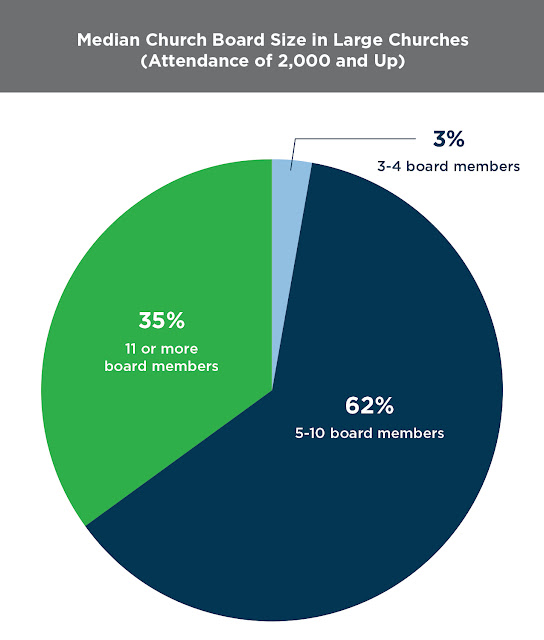By Warren Bird, Ph.D.
“The key to effective leadership in the vast majority of
today’s churches lies as much with their governing boards as it does
with their pastor.”[1]
Would you agree or disagree?
ECFA believes that governance boards are essential to the
success of churches. Every church has a board with legal responsibilities
related to strategy, operations, and policies. Its focus includes the church’s mission
and funding. This board often holds the pastor
accountable for annual or short-term goals or sets the senior pastor’s
compensation. Such a board must act if the church wanders off mission, financially
mismanages its various accounts, or violates its organizational charter in
other ways.
ECFA recently conducted a survey of church boards. It drew
881 participants from many types of churches. They represented a broad range of
church sizes, church ages, geographies, denominations and traditions. The
pastors, board members, and others at these churches offered many great ideas,
and we look forward to sharing them with you along with other ECFA research
findings here.
Is There an Ideal Size for a Board?
In
an earlier blog (here),
I argued for church boards made up of 5 people minimum, at least 3 of whom
could be considered “independent.” According to our survey findings, the
optimal size from boards rating themselves as highly effective is 7 or 8
people, with boards close in size rating themselves almost as highly, such as 5
or 6 people, or 9 or 10 people. However, at 4 or fewer board members, board
effectiveness is lower, and decidedly so. And on the other side, unfortunately
our survey offered only large-board options of “9 members,” “10 members,” and
“11 or more members.” Perhaps if we had offered even more specific choices—“11
members,” “12 members,” “13 members,” etc.—we might found a higher specific
line of demarcation—perhaps 12 members or higher, for example—where
effectiveness decidedly declines.
If a church has an attendance of 2,000 and higher, add one
person to all the numbers above. Thus the optional size for megachurch boards
that rate themselves as highly effective is 8 or 9 people.
Frequency of Meeting
Three quarters (76%) of church boards in our survey meet in
person 10 or more times a year. This meeting frequency does not change with
church size. Church board effectiveness drops sharply when boards meet fewer
than 4 times a year.
The typical board meeting runs 2 hours. Smaller churches
have slightly shorter meetings, and larger churches have slightly longer
meetings.
Length of Term
Do board members have term limits? The larger the church,
the more likely it is to have term limits. In larger churches with attendances
of 2,000 and higher, those who said yes to term limits are 79% vs. 21% no. For
those who have term limits, the median length of board service is 6 years, and
the average is 5.3 years. These numbers
do not meaningfully change with church size.
In church boards that rate
themselves as very effective and also have term limits, the most common pattern
is for someone to serve 6 consecutive years and then be required to
rotate off the board for at least a year.
How Board Members Are Selected
The majority of boards in our survey were selected by
congregational vote. However, self-perpetuating boards—those that nominate or
decide on new members—were more likely to be boards that describe themselves as
highly effective. Why? Maybe congregational votes alone almost never generate
the best selection of board members.
What to Call Your Board
What do church boards call themselves? Names are all over
the map. In ECFA’s survey, the most popular terms were Elder Board and Church
Board. The larger the church, the more likely it was to use the term Board of
Trustees.
Make the time and effort necessary to pursue excellence in
church governance! And if it helps, click
here for other blogs in this series.
[1] Malphurs, Aubrey, Leading Leaders: Empowering
Church Boards for Ministry Excellence, A New Paradigm for Board Leadership. Baker, 2005. Emphasis added to the quote.
[WB1]I
expanded my commentary to offer more specific advice, which does match the nonprofit
ministry norm.















